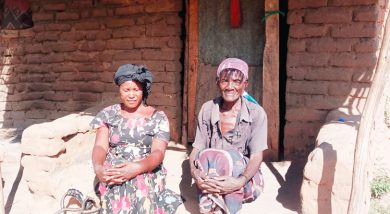Rural skills centres renew hope
Once, Emile Siwamba, from Chitipa, was happily married. Then in November 2016, her marriage broke up following a quarrel she had with her husband.
“I had to leave for my home village together with my three children,” she recalls.
Being solely dependent on her husband, the livelihood of Siwamba, 25, became unbearable.
She was unskilled and unlikely to get employment. To make matters worse, she quit school in Standard Six.
Once, she contemplated venturing into sex work to make ends meet, but did not want to become a laughing stock.

Kasama Skills Development Centre
“I was deep in despair, but I changed my mind when I thought about the consequences,” Siwamba says.
Earlier the same year, there was talk of government’s plans to turn disused buildings at Kasama Farm in Traditional Authority Mwaulambia, into a community skills development centre.
After a false start, the centre took shape—rekindling hope among many locals, including Siwamba.
Kasama Community Skills Development Centre, previously a tobacco shed almost became a refugee camp replacing Dzaleka in Dowa, but community protests forced government to rescind its decision.
Now, it is one of 12 rural skills development centres under the K3.8 billion Technical Education, Vocational and Entrepreneurship Training (Tevet) Improvement Project (TIP) funded by the World Bank.
According to Teveta head of projects and development Ishmael Ali, the Tevet Authority (Teveta) established four centres in each region to increase access to Tevet for out-of-school youth.
Teveta has refurbished and furnished structures that were abandoned, hired and trained instructors.
The centres will enrol 3 270 trainees into four-year-programmes, says Ali.
“We expect the institutions will sustain themselves even after the expiration of the project. After all, these centres are not owned by government, but by communities through community skills development committees,” he explains.
Teveta does not buy the equipment, but subcontracts it to the communities.
The 12 centres are expected to produce 1100 students a year.
“Malawi has one of the lowest Tevet access rates in the Sadc region. So we are trying to improve it,” says Ali.
Tevet receives 16 000 applications each year, but existing technical colleges space is only 1 500.
Even then, the enrolment into public and private technical colleges leaves behind many young Malawians from poor families.
Community skills centres offer the youth from rural and poor families a lifeline to skills development. They no longer have to live idle because of lack of skills.
At Kasama, the centre, opened last year, is already a busy place as it trains the youth in tailoring and design, carpentry and joinery as well as bricklaying.
In the border district, stories abound of numerous jobless young Malawians trafficked into slavish Tanzania and Zambia—lured by false promises of decent jobs.
Not long ago, eight boys were trafficked to work as slaves in estates in Tanzania.
The establishment of skills development centres in remote areas will help freeze human trafficking and emigration of desperate youths crossing the borders in search of jobs.
“We need this institution. The youth had nowhere to go to acquire vocational skills, forcing them to seek greener pastures across borders,” Kasama Skills Development Centre principal Flyson Nyondo said.
It has started off with 107 formal students and 31 on informal courses.
Formal students hold Junior Certificate of Education and higher qualifications while informal ones have lower education qualifications or none.
Siwamba is receiving informal training in bricklaying.
She is already reaping the benefits of the new skills as she constructs houses in her village.
“I never ever thought I would be a builder. I earn about K6 000 for any job I do,” Siwamba says.
The four-figure sum may be change to the well-off, but she says “it is a lot better than selling her body” as transactional sex increases the likelihood of contracting sexually transmitted infections, including HIV. n





